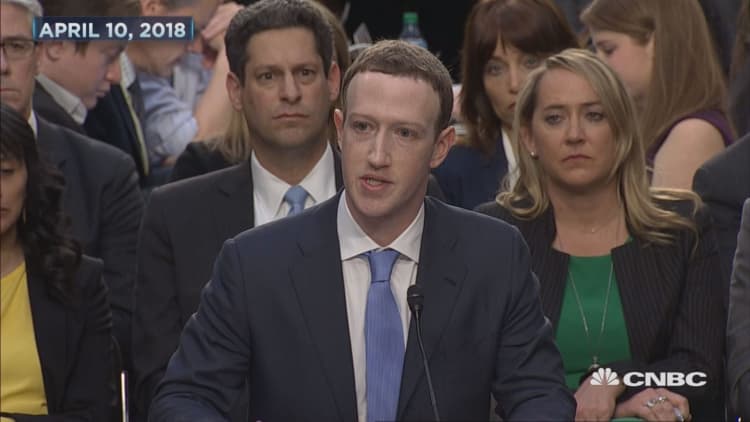One year ago, Facebook CEO Mark Zuckerberg told Capitol Hill lawmakers grilling him over the company's personal data fumbles that he believed regulation was "inevitable."
"I think the real question, as the internet becomes more important in people's lives, is what is the right regulation, not whether there should be or not," Zuckerberg said at the time.
A year later, Zuckerberg has laid out his own answer to that question before lawmakers could beat him to the punch. On March 30, he published a call for governments to regulate the internet in ways that will limit harmful content, protect privacy, maintain the integrity of elections and ensure data portability.
Facebook's evolving response to regulators, lawmakers, users and advertisers in the year since Zuckerberg's two-day testimony on Capitol Hill underscores the crisis of trust executives have tried to navigate while maintaining control of the business. The New York Times characterized Facebook's initial approach to the onslaught of PR faux pas as "Delay, Deny and Deflect." Now, Facebook seems to favor getting out in front of news reports of data breaches or regulatory proposals to set the narrative boundaries itself.
By and large, while potentially hefty fines loom from the Federal Trade Commission and from regulators abroad, Facebook has proven it's still able to keep users and advertisers on its platforms, if not win back their trust entirely. Over the past 12 months, Facebook's stock has rallied about 11% as investors have gained back confidence on the heels of the company's strong Q4 2018 earnings report in January. In 2019 alone, the stock has risen about 33%.
The earnings report showed that users and advertisers alike stuck with the platform despite privacy doubts. In its final quarter of 2018, Facebook met analysts' expectations for daily and monthly active users, which measured 1.52 billion and 2.32 billion, respectively. Its average revenue per user came in at $7.37 for the quarter, beating analyst estimates of $7.11, as forecast by FactSet.
Facebook did not respond to a request for comment on this article.
Here are some of the ways Facebook's messaging to various stakeholders have changed over the past year:
Regulators and lawmakers
When it comes to the people who could most directly force Facebook to change its business model — regulators and lawmakers — Facebook has shifted from a dismissive to proactive response.
Zuckerberg's direct call for regulation is just the most straightforward example of this strategy to date. Previously, Facebook had taken steps to display that it could regulate itself without lawmakers needing to step in. The company established election "war rooms" to combat misinformation around various international elections, hired legions of content moderators, built a new tool that helps disclose where political ads on the site come from and said it would establish an independent content oversight board empowered to overturn the company's decision on whether posts remain on its platform. Now, Zuckerberg has asked regulators to intervene after all, albeit under a framework he has laid out himself.
Facebook's more forthcoming approach to regulation mirrors the way it has changed its communication about misinformation and privacy breaches. Zuckerberg once dismissed the idea that misinformation on Facebook could have influenced the U.S. presidential election in 2016 as a "pretty crazy idea." He later apologized for the comment and has since acknowledged his site's role in spreading harmful messages and launched targeted projects to limit the spread of misinformation on around international elections.
Facebook now regularly hosts conference calls to inform the media when it takes down networks of pages for spreading misinformation and terrorist content.

Still, some lawmakers say Facebook should be even more transparent. Officials from the U.K., Canada and several other countries signed a letter in November saying they were "disappointed" Zuckerberg declined their invitation to discuss fake news and data privacy. Facebook instead sent another official to attend the hearing that month with representatives from nine countries.
While U.S. regulators have been slow to act, the story has been different abroad. For example, the U.K. this week revealed a proposal to hold Facebook legally responsible for harmful content on its site. And Australia passed a law last week that could put social media executives in jail for hosting videos of violent content in the wake of the New Zealand mosque massacres last month.
Users
Since its inception, Facebook has appealed to users by promising to bring the world closer. But that promise seemed to fall flat after disinformation spread by foreign actors on the platform deliberately drove a wedge between Facebook users during the run-up to the 2016 presidential election.
Facebook faced harsh backlash from users who threatened to leave the service as the hashtag #deletefacebook trended on other social media sites. Based on Facebook's user growth at the end of 2018, many of those threats seem to have been empty, but it's notable that user growth did stall in the U.S. and Canada in the fourth quarter.
Following the news that political research firm Cambridge Analytica allegedly gained access to personal data of millions of Facebook users without their consent, Zuckerberg was apologetic in a post on his Facebook page.
"We have a responsibility to protect your data, and if we can't then we don't deserve to serve you," he wrote.
But in a December post on his Facebook page, Zuckerberg pushed some of the blame onto "shady apps that abused people's data," following the release of internal emails about the company's decision to change its developer platform several years ago.
In 2019, it's become clear that Facebook is focused less on defending its current business model and more on building a new one. While Facebook previously embraced a more open approach to sharing information across an entire network on its News Feed, the company has recently begun shifting toward more private and ephemeral communication.
Facebook began laying the groundwork for this shift with Instagram's introduction of its "Stories" feature, originally popularized by Snapchat. The feature lets users post photos and videos that can disappear from a user's profile after a set amount of time. On Facebook's third quarter 2018 earnings call, Zuckerberg told analysts he understood the changing tide in user sentiment around sharing.
"People want to share in ways that don't stick around permanently, and I want to make sure that we fully embrace this," Zuckerberg said.
Zuckerberg solidified Facebook's pivot to privacy in a 3,000-word note in March outlining his vision for the future of the internet.
"I believe the future of communication will increasingly shift to private, encrypted services where people can be confident what they say to each other stays secure and their messages and content won't stick around forever," Zuckerberg wrote. "This is the future I hope we will help bring about."
The message provided a window into what Zuckerberg sees as Facebook's path forward. The company had already confirmed in January its plans to integrate the messaging systems across three of its services: Messenger, Instagram and WhatsApp.
Advertisers
While a handful of advertisers took a stand by pulling campaigns from Facebook in the weeks after the Cambridge Analytica scandal broke, Facebook's growing revenue suggests many have stuck by it.
That's perhaps because Facebook's appeal to advertisers is much simpler than that to users or regulators. As long as it remains one of the best places on the internet to target audiences, advertisers say they will keep coming back. A recent Piper Jaffray survey of teens found that 70% of Gen Z respondents, born between 1997 and 2012, preferred engaging with brands on Instagram over other social media channels.
As Facebook has announced its plans to focus more efforts on private, encrypted and ephemeral sharing, the company has promised both advertisers and investors it would come up with new ways to monetize these products.
On the company's Q3 2018 earnings call, Chief Operating Officer Sheryl Sandberg admitted that ad products for Stories are less robust than its legacy products but said the company would work with advertisers to figure out the best ways to create ads for the feature. She also said Facebook is figuring out how to help brands reach users through its messaging platforms through paid messages.
Facebook remains strong
Despite a year of scandals, data exposures and negative press, Facebook's business has remained healthy. Both Zuckerberg and Sandberg have kept their jobs, even though there was plenty of speculation that one of them would have to take the fall for failing to prevent the company's failures. (Still, a slew of other executives have left over the past 12 months, including the two Instagram founders and Facebook's Chief Product Officer Chris Cox.)
A year after Zuckerberg appeared before Congress, Facebook has developed an immunity to doing business in a highly scrutinized environment.
Watch: Here are some of the unintended consequences that may arise if Congress regulates tech



